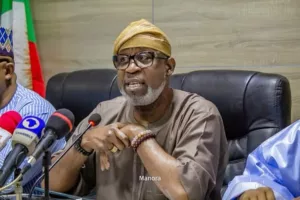Illegal mining has long plagued Nigeria, depriving the nation of substantial revenue and contributing to communal clashes, environmental degradation, and security problems. Recent initiatives by both federal and state governments signal a renewed commitment to address this critical issue and chart a pathway to the prosperity of the mining sector.
The federal government, through the Ministry of Mines and Steel Development

, has made its intention clear – the elimination of illegal mining is paramount to drive economic growth and competitiveness. Permanent secretary of the Ministry, Dr. Mrs. Mary Ogbe, emphasised the need for collaboration between the federal and state governments to curtail illegal mining activities. She rightly pointed out that illegal mining not only results in revenue loss but also fuels security problems and community clashes in mineral-rich states.
Dr. Ogbe acknowledged that the ministry alone cannot combat this menace, highlighting the importance of robust dialogue and cooperation with state governments. This cooperative approach, if effectively executed, can help create a more favorable environment for genuine investors, boost investor confidence, and enhance socio-economic transformation.
In the same vein, the executive governor of Taraba State, Dr. Agbu Kefas, condemned illegal mining activities in his state, which often led to communal clashes and environmental degradation. He urged the Ministry of Mines and Steel Development to establish effective communication and collaboration channels with state governments. Such collaboration could help authenticate licenses and documentation for mineral resource exploration, thereby attracting legitimate investors and driving socio-economic transformation within states.
Dele Alake, the Minister of Solid Minerals Development, declared the administration’s determination to make the solid mineral sector Nigeria’s “new oil and gas.” He underscored the government’s commitment to eliminating illegal mining through effective collaboration with security agencies.
The minister rightly pointed out that untamed illegal mining has deprived the country of substantial revenue. He emphasized the need for Nigeria to harness its potential to contribute significantly to the global market, particularly in the field of jewelry production.
Three leading political parties participating in the upcoming general elections have recognized the urgent need to address illegal mining, which annually costs Nigeria about $9 billion in losses. They acknowledge that tackling illegal mining is pivotal to diversifying the economy.
Fortunately, there had been some political commitment prior to the emergence of the Tinubu administration, including the ruling party to measures that would formalize employment for illegal miners, issue licenses to qualified firms, and increase revenue for the country. However, there are inherent challenges.
According to geologist, Godwin Adufe, the challenges related to illegal mining in Nigeria are multifaceted. He said they include the need to modernize the sector, address indigenization policies, and formalize employment for those involved in illegal mining.
On his part, Professor Olugbenga Okunola, President of the Geological Society of Nigeria, pointed out that the local companies that took over from expatriates in the 1970s lacked the capacity and funding to operate on a large scale. “This situation birthed illegal mining and smuggling,” he stated.
A social affairs analyst, Dr. Godwin Ogbu, agrees. He told NATIONAL ECONOMY that over the decades the federal government has not demonstrated the need to explore opportunities for revenue generation in the mining sector. “The federal government is grossly distracted by proceeds from oil revenue; that is being shortsighted because the petroleum industry is not stable as oil prices are determined by the vagaries of activities of the international market,” he said.
He also noted that if the government must develop the mining sector, it has to be home-grown and not dependent on foreign investors to develop it, he stressed that such an approach will make mining attractive to foreigners.
An economist and business consultant, Ben Atuma, on his part, noted that combating illegal mining in Nigeria is not just an economic necessity; it is a vital step towards economic prosperity, job creation, and the country’s ability to compete globally. “The collaborative efforts of federal and state governments, as well as the commitment of political parties, signal a positive shift towards addressing this longstanding issue,” he stated.
Atuma added that to achieve lasting success in eliminating illegal mining, Nigeria must modernise the mining sector, formalise employment for miners, and create an environment that attracts legitimate investors. “By doing so, Nigeria can unlock the potential of its mineral resources and contribute significantly to its economic growth and diversification,” he said.





